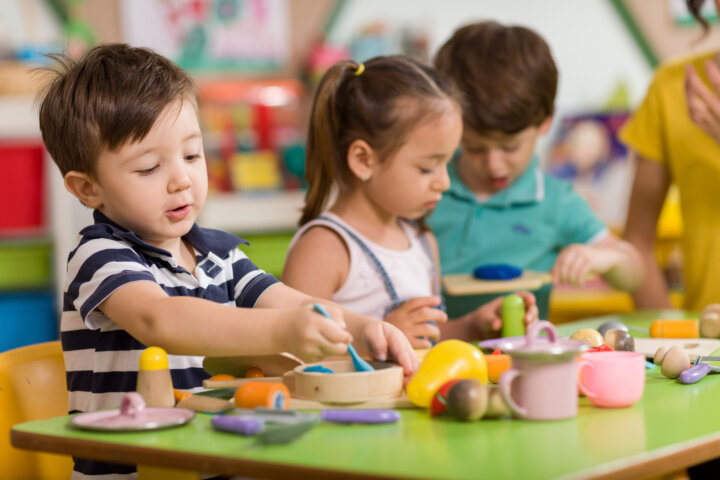Fostran i förskolan
När förskollärare fostrar barn i förskolan drivs de av några grundläggande principer. I Airi Bigstens avhandling framgår hur de olika principerna i praktiken ofta kolliderar i förskolemiljön.
Airi Bigsten
Eva Johansson och Kennert Orlenius
Professor Eva Alerby, Luleå tekniska universitet
Göteborgs universitet
2015-06-11
Fostran i förskolan
Upbringing in preschool
Institutionen för pedagogik, kommunikation och lärande
Fostran i förskolan
Intresset i denna studie riktar sig mot förskollärares bevekelsegrunder för det egna handlandet då de fostrar barn i förskolan. En utgångspunkt för studien är att förskollärare arbetar med intentionen att forma och påverka barn mot något som anses som önskvärt. Det önskvärda kan vara förankrat såväl i samhällsuppdraget som i förskollärares egna erfarenheter och kan både handla om att barn skall växa som personer och som samhällsmedborgare. Fostran sker både här och nu men den är också riktad mot framtiden.
Interaktionen mellan förskollärare och barn har videofilmats. Videosekvenserna bildar grund för de intervjuer som genomförts med utgångspunkt i följande frågor: Vad händer i denna sekvens? Vad är viktigt att barn lär sig i denna situation? Varför är det viktigt att de lär sig detta? I analysarbetet har tre teman vuxit fram. I dessa teman kommer viktiga dimensioner av fostran till uttryck. Dimensionerna handlar både om förskollärarnas bevekelsegrunder då de fostrar barn och de utmaningar de ställs inför då. Förskollärarnas bevekelsegrunder synliggörs i deras resonemang som intentioner (vad), motiv (varför) och handlingar (hur). Det första temat som vuxit fram är Förskollärare vill respektera barns unicitet. I detta tema beskrivs på vilket sätt det unika barnet möts av både förskollärare och barn. Det andra temat är Förskollärare vill uppnå ordning. I detta tema synliggörs hur fostran kommer till uttryck genom ordning. Det tredje temat Existens – förskollärare vill lägga grunden för det framtida livet, synliggör hur fostran kommer till uttryck i förskolan sedd från ett här- och nuperspektiv men är också riktat mot det framtida livet. Förskollärarnas bevekelsegrunder handlar ytterst om barns rättigheter. Barn har rätt att bli accepterade i sin unicitet, de här rätt till en tillvaro i förskolan där ordning råder samt de har rätt till existens, både i ett här och nu perspektiv men också i ett framtida liv.
Upbringing in preschool
Upbringing in preschool. Keywords: Upbringing, relational, uniqueness, order, existence, lifeworld, Preschool. The purpose of the current study is to generate knowledge about the preschool teacher’s incitements to action in the work they conduct around the upbringing of children, as well as how preschool teachers experience their own actions in interactions with children.
The current study adopts a phenomenological lifeworld approach (Merleau-Ponty, 1962; Schütz, 1966). This approach has been chosen in order to be able to understand the phenomenon of upbringing from the preschool teacher’s perspective. The study has been carried out in four different sections at four different preschools. Interaction between nine preschool teachers and 64 children (3-5 years old) at the four different sections was video-recorded. The data was comprised of video observations and interviews using the method of stimulated recall (Caldehead, 1981).
In the analyses conducted three themes emerged. The first theme that emerged is The preschool teachers wish to respect each child’s uniqueness. In this theme the ways in which the unique child is met both by the preschool teachers and other children is described. The second theme is The preschool teachers want to achieve order. In this theme the ways in which upbringing finds expression through order are revealed. The third theme Existence: the preschool teachers want to lay the foundations for life in the future, shows how – both in the here-and-now, but also from a future-oriented perspective – upbringing finds forms of expression in preschool. The preschool teachers’ incitements to action indicate a striving to respect children’s rights to being unique individuals, the right to order and predictability, and the right to have hope, both in the here-and-now and in the future. These rights are relational and interrelated with one another. For the preschool teachers these rights are of importance, both from the child’s perspective, but also in relation to others. On occasions the adults can abstain from certain rights, if this is regarded as relevant in the particular situation. Rights also involve a degree of responsibility. Using these concepts, dimensions of upbringing can be identified and analysed, both in research as well as in pedagogical practice. In this way the study can contribute to creating a more in-depth understanding of upbringing and its nature, and can challenge teachers to develop their own practice and thus contribute in the ongoing development of the profession.
Relaterade länkar

Svenska som andraspråk
 Åk F–Vux
Åk F–Vux
När leken inte fungerar
 Fsk
Fsk


